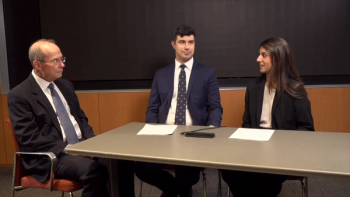
How to reach glaucoma patients through social media
Here's how your practice can utilize Facebook to reach out and spread the word about how you can help people with glaucoma.
Editor’s Note: Welcome to “Let's Chat,” a blog series featuring contributions from members of the ophthalmic community. These blogs are an opportunity for ophthalmic bloggers to engage with readers with about a topic that is top of mind, whether it is practice management, experiences with patients, the industry, medicine in general, or healthcare reform. The views expressed in these blogs are those of their respective contributors and do not represent the views of Ophthalmology Times or UBM Medica.
I’m a
But we’re not alone: More than 1 billion people of all ages use Facebook, including many members of older generations who join to share photos and communicate with extended family and friends.
That’s why in our practice, we use Facebook to reach out to spread the word about how we can help people with glaucoma.
In fact, Facebook has been a much more effective tool than mailings, many of which are dismissed as junk mail or returned as undeliverable because patients have moved.
We were encouraged to expand our Facebook efforts when we began encouraging
Posting to engage users
Given the nature of Facebook, people with many friends and connections to various businesses and brands can be bombarded with posts in their feeds. We need to be brief and engaging. We find that patient stories get the best response. We do short videos that highlight physicians and some of their patients, including how they found us, what problems they have, and their experience with the physician.
Posting news highlights on our Facebook profile has been successful as well, drawing comments and phone calls to our office about new things we offer. Although we are part of a teaching hospital and have many subspecialties within our ophthalmology clinic, we choose to share a Facebook page and spend time dedicating content to each area (typically highlighting a service every week).
By not breaking up patients on different Facebook pages according to diagnosis (i.e., a glaucoma page, cataract page, LASIK page, etc.), we find that patients enjoy reading about the interesting new clinical trials and treatments offered at the clinic, and they pass along the information to their connections who have that problem. We have found Facebook to be very useful for patient surveys as well, and the results have helped us determine how we can better serve our patients.
Reaching new glaucoma patients
As part of our focus on different areas of the practice, we dedicate an entire month of Facebook posts to glaucoma. During that month, we highlight early diagnosis, testing, and different kinds of glaucoma, ending with treatment options. We go over common medications and their pros and cons.
In addition, we highlight surgical procedures-especially those that are new or not performed elsewhere in the community. The school has a marketing team that helps us record new cases so we have stories ready to post.
One of the most recent procedures we featured was an implantation device (XEN Gel Stent, Allergan). When we did the first implant in Los Angeles, we featured the milestone on Facebook and got a big response on our page and by email and phone. My new patient consultations for the implant were built out for two months. Patients traveled from as far away as South Korea. Not all of them were candidates for the implant, but we were able to help control their glaucoma.
All of these efforts require strategy, planning, writing and video production. This assistance is available through my school, but consultants can provide the same services to any practice. We know that many patients are struggling with their drop medications, and not all practitioners offer a range of interventions to help. Facebook can help us reach those patients and get them the care they need to preserve their vision.
Disclosures:
Alena Reznik, MD
Dr. Reznik is the assistant professor of clinical ophthalmology and co-director of the glaucoma fellowship program at the University of California Roski Eye Institute. Dr. Reznik is a consultant for Allergan, Glaukos, and Alcon.
Newsletter
Don’t miss out—get Ophthalmology Times updates on the latest clinical advancements and expert interviews, straight to your inbox.





























